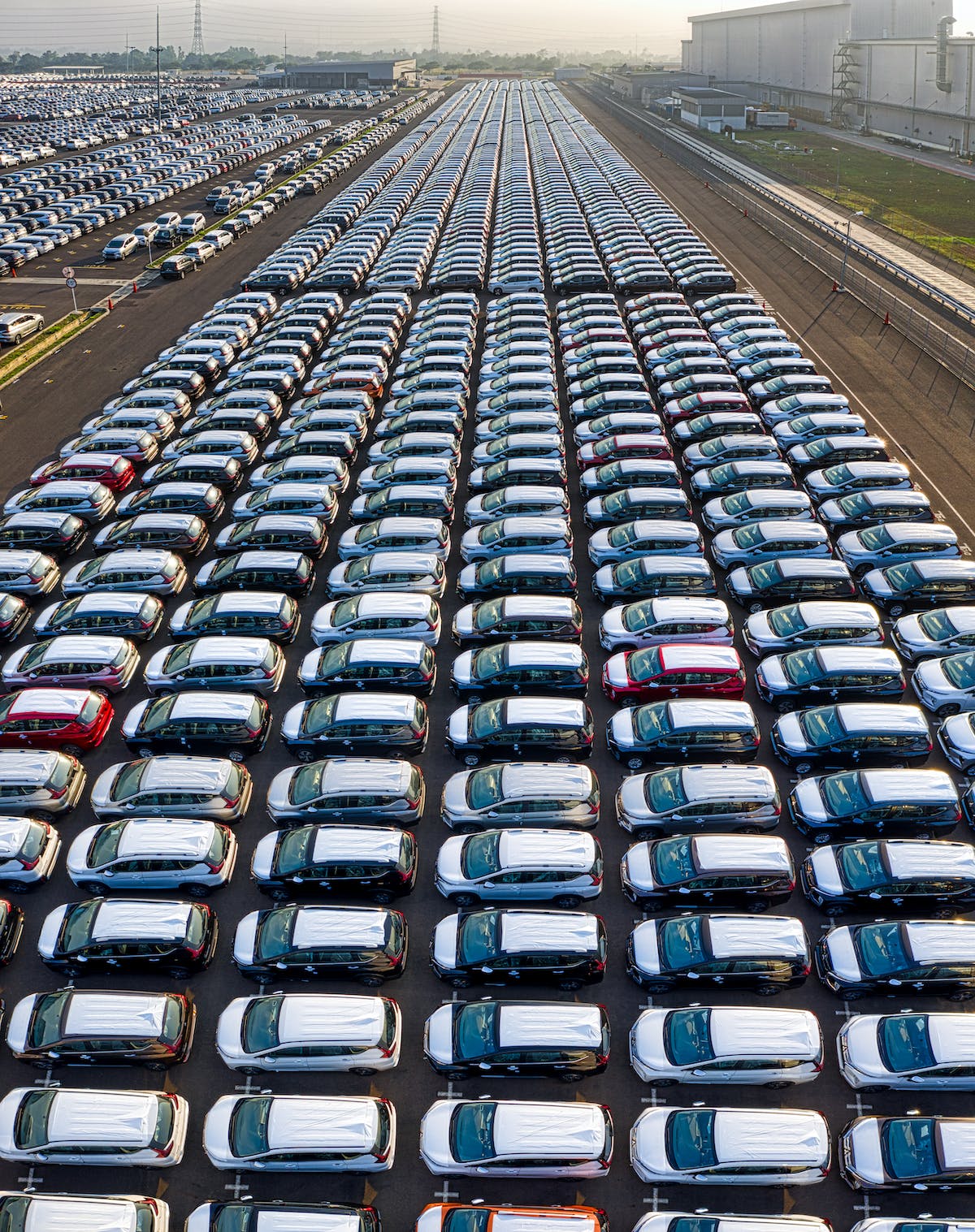Leading Off: The Future For Auto Workers—The Good & Bad
We will be featuring in the very near future global insights into the future for auto workers. We have two aspects to touch on in this issue.
The Good: Our regular readers may recall that this past December, we featured a story about a tie-up between the United Mine Workers of America and Sparkz, a battery manufacturer. We had the chance to post questions to the CEO of Sparkz, Sanjiv Malhotra. Generally, we asked in our stage setting for the Q and A whether the Sparkz agreement with the mine workers meets the principles of the UMWA’s transition strategy? And is it a model for other Just Transition efforts?
Clearly, establishing a working relationship between a union and a company from the outset of the foundation of a factory operation lays down an encouraging marker—we noted, then, of course, that we would need to see the details of the final collective bargaining agreement before making a final determination of the direction of the working conditions.
Sparkz has signaled that the relationship with the UMWA is not a one-off. Just a few weeks ago, the company went public with a new agreement, this time with the United Auto Workers:
California-based battery manufacturer startup Sparkz Inc said Tuesday it had agreed to a partnership with the United Auto Workers (UAW) union as it finalizes plans to begin commercializing zero-cobalt, zero-nickel battery production.
The UAW has been working to organize new battery facilities as the auto industry shifts to electric vehicle production. Sparkz and the UAW said they had signed a memorandum of understanding establishing a national labor-management agreement and statement of neutrality.
To further explain the company’s approach, we invited Malhotra to pen an Opinion piece for the newsletter, which you can find in that section below.
The Bad: The Sparkz-UAW partnership highlights the broader difficult terrain facing auto workers globally. To date, there is very little in the way of “high bar” Just Transition plans for the tens of thousands of auto workers who will lose their jobs in the move into electric vehicles, a move that is central to virtually every auto company.
The electric vehicle industry is exploding across the globe. The International Energy Agency estimated that, while 16.5 million EVs were on the road by the end of 2021, that number will skyrocket to 350 million by 2030. That phenomenal growth is good news for climate change efforts.
However, for auto workers, this is a terrifying prospect. It is an accepted fact that the EV industry will require far fewer workers because EVs contain a substantially smaller number of parts, requiring a reduced assembly line workforce. According to one estimate by the French union confederation CGT, Stellantis plans on eliminating up to 60 percent of its assembly workforce by 2035.
In other words, there is now a five-alarm urgency for auto workers who face impending negative consequences, unlike other workers in other industries who are likely to face disruption due to the decarbonization movement afoot; coal mining, for example, in countries like India, is likely to decline but at a slower pace over a longer horizon.
The shift to electric vehicles is happening right now.
In our last issue, we discussed principles put forth last year by the Canadian auto workers union, UNIFOR, for the transition to electric vehicles. Those principles, however, now have greater urgency—the U.S. and Canadian auto workers collective bargaining agreements with the major auto companies—Ford, General Motors and Chrysler-parent Stellantis—will expire in September 2023.
If the above statistics from the IEA are accurate, then, this set of contracts to be negotiated will be crucial in establishing a standard for a “high bar” Just Transition for the next generation of auto workers—and beyond.
SPONSOR MESSAGE
A message from the Australian Mining And Energy Union
We are fighting back, not just for ourselves but for the future generation of mineworkers. Workers deserve better. Our families and communities deserve better. Visit us

Spotlight: Hyundai—Subsidies For A Sketchy Player?
We’ve long been skeptical about the large publicly-financed subsidies—mainly, through tax concessions—given to corporations. We just don’t think that there is typically any economic justification underlying a company demand to pocket public financing other than the answer George Mallory gave in 1924 when asked why he would climb Mount Everest: “Because it’s there”.
This is especially true for public money ending up in the coffers of companies with a consistent record of acting against the interest of workers and their communities.
We bring this up here, in connection to Just Transition, because of this development:
Hyundai Motor Group and LG Energy Solutions announced plans on Thursday to build a $4.3 billion electric vehicle battery plant in Georgia, the latest clean energy facility to come to the state.
The project is expected to bring 3,000 new jobs to southeast Georgia by the end of 2025. It is the second battery manufacturing plant that Hyundai is developing in the state, which has used incentives in the Inflation Reduction Act to open new facilities. Hyundai announced in December that it had teamed up with SK On, a South Korean electric vehicle battery developer, to build a plant in Bartow County.
Presumably, one can add this battery manufacturing plant to the list of potential climate-change jobs in the offing for workers who will lose their jobs in other industries, including in the automotive industry, per the above “Leading Off” item.
It’s fairly clear why this plant is being sited in Georgia: that state is a so-called “right-to-work” state, which, in U.S. parlance, translates into very unfriendly territory for unions to organize new workers. It is one of th
The key question here is: why is the U.S. government allowing tax-payer subsidies to flow to a company that violates the law with impunity?
Hyundai has a very long dismal track record across the globe. For space reasons, we will only highlight here some of the key aspects that stretch back many years.
In 2010, Hyundai workers in India went on strike because the company refused to negotiate with the union:
More than 1300 Hyundai Motor India Employees’ Union (HMIEU) workers at Hyundai Motor India Limited (HMIL), located in Chennai, Tamil Nadu, went on strike on 20 April after management refused to negotiate with the union. Since July 2007, HMIEU trade union leaders, members, and supporters have suffered from dismissals, suspensions, and transfers. They have also faced the company’s widespread use of threats, harassment, and intimidation for joining a union. The struggle intensified on 6 May when 900 strikers were arrested, which prompted letters of protest as well as meetings and demonstrations at Hyundai’s headquarters in Korea by International Metalworkers’ Federation affiliates. As of December 2009, 65 workers have been fired for their union activities and 34 more were in the process of being dismissed.
On 23 July, Hyundai signed a wage settlement with a pay rise over a three-year period. However, a section of employees of the Hyundai Motors at its Sriperumbudur plant in Tamil Nadu began a sit-down strike protesting the wage agreement because management was forcing them to agree to settlement. The company also refused to recognise any established union in its plant at Irungattukottai in Tamil Nadu. HMIL Chairman and Managing Director H S Lheem said that the company would only negotiate with the Workers’ Committee set up by management, with which the company had recently entered into a wage settlement.
In 2017, the company was charged in South Korea for union busting tactics:
Prosecutors’ indictment of Hyundai Motor executives and the company’s corporation as “co-offenders” in union-busting tactics by subcontractor Yoosung Enterprise comes six years after the incident in question. But it could also be a dramatic break with their previous approach to investigations of labor-related cases, where enforcement of the law was typically focused on the employer’s interests. With a new administration emphasizing protections on basic labor rights means the next question is whether Prosecutors will begin more aggressively punishing anti-union crimes.
In a May 24 indictment against four executives of Hyundai Motor on charges of violating the Trade Union and Labor Relations Adjustment Act with their involvement in Yoosung Enterprise’s union-busting efforts, the Cheonan branch of the Daejeon District Prosecutors’ Office listed Hyundai Motor as a “co-offender” alongside Yoosung. One of the four, surnamed Choi, was head of the moving parts development office in the Hyundai Motor purchasing headquarters at the time of the anti-union activities in Sep. 2011.
More recently, Hyundai was caught using a supplier that employed child laborers:
A group that works with union pension funds is pressing Hyundai Motor Co to respond to reports of child labor at U.S. parts suppliers, warning of potential reputational damage to the Korean automaker.
SOC Investment Group, which works with union pension funds that have more than $250 billion in assets, sent a sharply worded letter on Wednesday to company chairman Euisun Chung, saying investors were concerned in the wake of a July investigation by Reuters that found child labor at a Hyundai subsidiary in Alabama. In addition, the letter cited a recent federal and state investigation into children working at another Hyundai supplier in the state.
And, when it is caught red-handed, as it was in the case of child labor, the company doesn’t fix it’s mess. It walked away from workers in Alabama:
Months after reports first appeared about multiple incidents of child labor at their suppliers in Alabama, Hyundai Motors is addressing the problem publicly. Their solution appears to be to sever ties with suppliers SMART (a company that is majority-owned by Hyundai) and SL Alabama which will likely result in job losses for hundreds of workers, without doing anything to address what appears to be a systemic problem. By abandoning these workers, the company – which has received millions of dollars in subsidies – has effectively walked away from a problem without any regard to the consequences of their actions.
“Hyundai’s actions are punishing the very workers who came forward to put an end to child labor,” says UAW President Ray Curry. “By severing ties with these Alabama suppliers, hundreds of workers in these plants will likely lose their jobs, creating a crisis for workers, their families and their communities – without doing anything to fix the problem.”
It’s record is also littered with fines and civil judgements in the U.S. amounting to well over $1.6 billion just over the past decade.
It’s mind-boggling to think that a company can repeatedly break the most basic rules of fair play and still feed at the trough of taxpayers money.
Just Transition For All will always highlight companies, like Sparkz, who structure frameworks that set a basic foundation for workers to make a fair living. However, Just Transition For All will also call out companies who break the law, thereby gaining an unfair competitive advantage over workers and law-abiding companies.

Ideas: The World Bank’s Role In Just Transition
The World Bank does not have a great reputation, especially in the Global South. For decades, the Bank, along with its Bretton Woods-created “twin” the International Monetary Fund, was a symbol of austerity—the Bank would extend loans to countries in dire financial straights, in return for the imposition of austerity that usually came in the form of cutbacks in public sector funding.
In a very recent blog post, a World Bank senior managing director, gave a lengthy description of its vision for its work entitled, “Climate Change and Paris Alignment: “The Climate is Changing, and So Are We”. It includes these two passages:
From phasing out fossil fuels, to developing new diagnostics that drive climate action at the country level, to issuing innovative sustainability bonds, to ensuring our operations are Paris-aligned, our ambition is to meet the double test of being sharply focused on our core development mandate of poverty reduction and tackle at the same time the most pressing global challenges of which climate is perhaps the most prominent. All of this requires effective partnerships with the countries affected, the private sector, and development partners.
And:
With this finance, we have been moving from greening projects to greening entire economies, scaling up renewables, supporting fossil fuel subsidy reforms, investing in large-scale forest management programs, reducing methane in sanitation and waste, broadening access to clean cooking, fostering climate-smart agricultural practices, and helping clients to tap green value-chains. We are helping to transform cities to be cleaner and infrastructure to be greener, strengthening coastal area resilience, and supporting clients to green the financial system and tap growing carbon markets.
We hope to see what that change means for workers—because throughout this soliloquy there doesn’t seem to be a recognition that “economies” are full of workers.
With the globe facing the creation of thousands of economic wastelands—communities hollowed out by the disappearance of good-paying jobs, replaced by sub-standard work—the World Bank seems poised to continue its long history of underwriting projects that sketch a good picture for a bottom-line spread sheet but does very little for the people who live near, and even work for, a menu of projects.

Opinion: A Patriotic Energy Revolution
by Sanjiv Malhotra
West Virginia’s coal miners, California’s auto workers and an innovative battery company born from America’s leading research labs are launching a patriotic energy revolution. We believe America’s economic prosperity depends upon pioneering partnerships between our company SPARKZ and the United Mine Workers of America in West Virginia and our recently announced pact with the United Auto Workers.
These agreements create a strong foothold for the unions in battery manufacturing and provide SPARKZ with a partnership to recruit and train the best workers in America.
Currently, manufacturers in Asia produce 90 percent of the world’s battery capacity. The growing needs of a variety of markets demand we as a nation reverse this trend. We’ve pinpointed these highly trained workers to boost the effort to rightfully focus on ending our country’s heavy reliance on China for battery components.
Our mission is to end China’s dominance in battery manufacturing, while preserving and expanding jobs for the families and their communities where we work.
SPARKZ will begin commercialization of a high energy-density Cobalt-free, American-made Lithium-ion battery, while we continue our groundbreaking research and development focused on re-engineering the rest of the battery supply chain.
Our first commercial product will eliminate cobalt, traditionally used in the cathode of a Lithium-ion battery, with the objective of reducing the cost of lithium battery production in the U.S., while also eliminating a primary environmental concern, and reducing chokepoints created by a foreign supply-chain.
SPARKZ announced plans in 2022 to set up shop in West Virginia for material processing and production of cells and modules. The project, projected to begin manufacturing in 2023, will help coalfield families transition into the new energy economy. SPARKZ will continue to collaborate exclusively with the United Mine Workers of America in West Virginia.
California will be the first location for the partnership. SPARKZ has committed to over 800 new, full-time jobs and over $700 million of investment in the state. SPARKZ is finalizing plans for its first GigaCampus location in central California to expand commercialization of its zero-cobalt, zero-nickel battery, which will initially employ 500 workers and could grow to as many as 3,000.
Workforce development will be critical to our scaling and success. SPARKZ is proud to partner with the UAW to secure the American worker’s place in the new energy economy, while re-engineering the battery supply chain domestically. This partnership is a symbol of American innovation and American workers building a high-quality energy future together, while fighting to end foreign dominance of advanced batteries.
SPARKZ believes agreements with UAW and the UMWA will make us more competitive against industry leaders by leveraging the talents of auto workers that focus on the highest quality and safety standards.
Last month at our announcement, UAW Region 6 Director Mike Miller said union members have “a critical role to play in the fight for climate justice and “collective bargaining in the emerging green economy is a key piece of that work.”
We agree. Innovation and the workers that produce sustainable technologies play the key role in bringing manufacturing back to the United States and boosting our global position as a leader in climate technologies.
Malhotra is the founder and CEO of SPARKZ

Links
Clean Energy Finance Corporation: is the Australian government’s official “green bank” and describes its activities thus—”We invest alongside private investors, innovators and industry leaders, drawing on our deep sector experience, investment expertise and portfolio strength to fill market gaps and maximise our impact. In investing on behalf of the Australian Government, we have a strong commitment to deliver a positive return across our portfolio.”


















